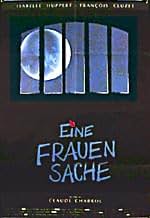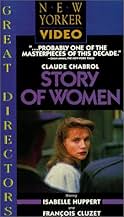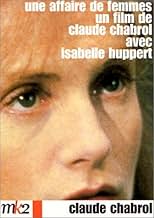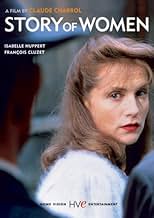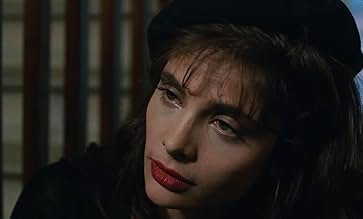Une affaire de femmes
- 1988
- Tous publics
- 1h 48min
NOTE IMDb
7,5/10
6,2 k
MA NOTE
Une femme au foyer dans la France occupée par les nazis a du mal à joindre les deux bouts, lorsque son mari rentre chez lui après avoir été blessé pendant la guerre.Une femme au foyer dans la France occupée par les nazis a du mal à joindre les deux bouts, lorsque son mari rentre chez lui après avoir été blessé pendant la guerre.Une femme au foyer dans la France occupée par les nazis a du mal à joindre les deux bouts, lorsque son mari rentre chez lui après avoir été blessé pendant la guerre.
- Réalisation
- Scénario
- Casting principal
- Récompenses
- 14 victoires et 8 nominations au total
Avis à la une
Marie (Isabelle Huppert) helps women have abortions in Nazi-occupied France, which turns out to be an unexpected income. However, she was arrested and sentenced to death by the time's reactionary government, looking for public examples to give to the nation.
Marie Latour (in reality her real name was Marie-Louise Giraud), was the last woman to be guillotined in France. The film tells this tragic story with dry realism, both in terms of the dialogues and the era's accurate reconstruction.
The film was in competion at the Italian 1988 Venice Film Festival. Isabelle Huppert won the Coppa Volpi award for best female interpretation, while outside conservative Catholic associations clamoured for the film to be withdrawn from distribution, for Marie's desperate prayer before being beheaded, accused by them fanatic groups to be 'blasphemous'. The film was released anyway.
Marie Latour (in reality her real name was Marie-Louise Giraud), was the last woman to be guillotined in France. The film tells this tragic story with dry realism, both in terms of the dialogues and the era's accurate reconstruction.
The film was in competion at the Italian 1988 Venice Film Festival. Isabelle Huppert won the Coppa Volpi award for best female interpretation, while outside conservative Catholic associations clamoured for the film to be withdrawn from distribution, for Marie's desperate prayer before being beheaded, accused by them fanatic groups to be 'blasphemous'. The film was released anyway.
'Une affaire de femmes' (the English distribution title was 'Story of Women'), Claude Chabrol's 1988 film gives Isabelle Huppert the opportunity to create one of the most memorable roles of a formidable career. Chabrol, the director about whom Huppert would posthumously say that he filmed her like a father, sets his drama in the period of World War II and the occupation, bringing to screen the biography of the last woman to be sentenced to death and executed in the history of France. The charge was the practice of illegal abortions, and the exemplary punishment was a consequence of the moral and national decay of the Vichy collaborationist regime. The pro-life vs. Pro-choice are still current in many countries of the world today (not in France), but that is not the main theme of the film. In fact, Chabrol avoids any moral judgment on one side or the other of this dispute. His target is - as in many of his other films - the French bourgeoisie during the war, in one of the most abysmal periods of its history, a period marked by collaboration, corruption, immorality and hypocrisy.
The story takes place in the months and the first years after the defeat of France, the occupation of part of the country's territory and the installation in Vichy of a collaborationist government under the leadership of Marshal Petain. Marie is one of many young women left behind alone with two children to care for after her husband leaves for war. She is a simple woman living in a provincial town whose dreams of becoming a singer or even of leading a normal life have been dashed by the war. Somewhat by chance, while helping a neighbor friend, she discovers her ability to perform abortions. The return of her husband does not improve the family situation, on the contrary. Paul, traumatized by the war, becomes an extra burden, and any spark of love that may have existed between the two is now extinguished. Marie decides to turn her talent for helping other women into a source of income. There is no shortage of opportunities. Many women left alone are forced to look for support among occupiers or collaborators, and the children resulting from these relationships are unwanted burdens and risk compromising the mothers morally and socially. Marie's business prospers, the woman begins enjoy her better life, she also takes a lover, while asking herself few questions about what she is doing. However, the jealous husband does not accept the situation.
Isabelle Huppert is perfect in such roles, where facts are ambiguous and feelings repressed. Neither the screenwriters nor the director insist on making any moral judgment about the woman's actions. When she is caught, tried and condemned by a system that wants to make her a punishable example of immorality, the filmmakers' compassion seems to shift more towards the children left behind and destined to remain motherless. Huppert's Marie combines innocence with carelessness, love for children with a desire to live her life at all costs. It's a complex and interesting character, one of the best roles of his career. François Cluzet is her acting partner as the husband whose deeds as a sort of catalyst for the woman's downfall. As for Chabrol, during this period he had filtered and decanted all the lessons of New Wave cinema and had reached a remarkable efficiency and acuity of his means of expression - both in writing the story (inspired by a book by Francis Szpiner - jurist and politician, nowadays mayor of a Parisian arrondissement) but also in working with the camera. With restraint and without pathos, 'Une affaire de femmes' is one of the harshest cinematic indictments of French collaborationism and a statement of compassion for its victims.
The story takes place in the months and the first years after the defeat of France, the occupation of part of the country's territory and the installation in Vichy of a collaborationist government under the leadership of Marshal Petain. Marie is one of many young women left behind alone with two children to care for after her husband leaves for war. She is a simple woman living in a provincial town whose dreams of becoming a singer or even of leading a normal life have been dashed by the war. Somewhat by chance, while helping a neighbor friend, she discovers her ability to perform abortions. The return of her husband does not improve the family situation, on the contrary. Paul, traumatized by the war, becomes an extra burden, and any spark of love that may have existed between the two is now extinguished. Marie decides to turn her talent for helping other women into a source of income. There is no shortage of opportunities. Many women left alone are forced to look for support among occupiers or collaborators, and the children resulting from these relationships are unwanted burdens and risk compromising the mothers morally and socially. Marie's business prospers, the woman begins enjoy her better life, she also takes a lover, while asking herself few questions about what she is doing. However, the jealous husband does not accept the situation.
Isabelle Huppert is perfect in such roles, where facts are ambiguous and feelings repressed. Neither the screenwriters nor the director insist on making any moral judgment about the woman's actions. When she is caught, tried and condemned by a system that wants to make her a punishable example of immorality, the filmmakers' compassion seems to shift more towards the children left behind and destined to remain motherless. Huppert's Marie combines innocence with carelessness, love for children with a desire to live her life at all costs. It's a complex and interesting character, one of the best roles of his career. François Cluzet is her acting partner as the husband whose deeds as a sort of catalyst for the woman's downfall. As for Chabrol, during this period he had filtered and decanted all the lessons of New Wave cinema and had reached a remarkable efficiency and acuity of his means of expression - both in writing the story (inspired by a book by Francis Szpiner - jurist and politician, nowadays mayor of a Parisian arrondissement) but also in working with the camera. With restraint and without pathos, 'Une affaire de femmes' is one of the harshest cinematic indictments of French collaborationism and a statement of compassion for its victims.
I'd like to focus on this film as a French film, not of the United States. If one has seen "La Chagrin et la Pitie," then one knows the legacy of this film. France was not perfect during WWII. Not everyone in France was part of the resistance, mainly, they were trying to survive. I think its an amazing film that sheds light on a crucial point in French history. Yes, it's about abortion and Chabrol does a great job ensuring his abortionist is less than perfect. That's a wonderful point he makes, that no one is perfect, not even the moral majority of the government. But, I come away from this film with the same questions that I get from "Lacombe, Lucien," which are: 'what would I have done?' And, please, don't Monday morning quarterback World War II.
Isabelle Huppert portrays an uneducated but self-reliant wartime mother of two, who almost ruthlessly assumes the traditional male role of family breadwinner by helping (to use an old euphemism) young girls 'in trouble'. The film isn't exactly impartial in its attitude toward the opposite sex, but don't me misled by the somewhat presumptuous title: it isn't strictly a story for women, and despite the vocation of its heroine has little to say about the volatile issue of abortion. The focus is more on the plight of women as second-class citizens, forced by necessity to fend for themselves (and rely on each other) while their men are away playing soldiers. It tells a complex story very simply, avoiding any soapbox grandstanding but allowing Huppert a chance to invest her character with plenty of gender-specific spleen. The final impact is undeniable: it's an often powerful experience, likely to stir up plenty of talk and emotion.
This is a true story and the heroine is not unlike Louis Malle's hero "Lacombe Lucien".They are too coarse,too immature to realize what they are doing.Lucien could have opted for the Resistance,but he's deemed too stupid by the schoolteacher and he winds up in Collaboration.Chabrol's heroine only wants to "help" her neighbors before she realizes she can earn a lot of dough with abortion.Chabrol watches his character as an entomologist,as she makes her way through those troubled times:the world has gone mad,and anyway is abortion worse than what the authorities are doing with the Jews ?Maréchal Petain's France was so humiliated that it tried to make up with it by focusing on "morality".
The heroine could make also think of Violette Nozières,another Chabrol movie which also featured Huppert.And she's also akin to Sandrine Bonnaire's character in "la cérémonie".All are women overtaken by events,all are victims of a well-meaning society,Chabrol's trademark. "Une affaire de femmes" is certainly a good work although it lacks the sweep and the directing innovations of his late sixties/early seventies classics.
The heroine could make also think of Violette Nozières,another Chabrol movie which also featured Huppert.And she's also akin to Sandrine Bonnaire's character in "la cérémonie".All are women overtaken by events,all are victims of a well-meaning society,Chabrol's trademark. "Une affaire de femmes" is certainly a good work although it lacks the sweep and the directing innovations of his late sixties/early seventies classics.
Le saviez-vous
- AnecdotesBased upon the true story of Marie-Louise Giraud, with character names changed.
- Bandes originalesLe Poème de l'Amour et de la Mer
Written by Ernest Chausson
Meilleurs choix
Connectez-vous pour évaluer et suivre la liste de favoris afin de recevoir des recommandations personnalisées
- How long is Story of Women?Alimenté par Alexa
Détails
- Date de sortie
- Pays d’origine
- Site officiel
- Langues
- Aussi connu sous le nom de
- Story of Women
- Lieux de tournage
- Coulommiers, Seine-et-Marne, France(interiors: women's prison)
- Sociétés de production
- Voir plus de crédits d'entreprise sur IMDbPro
Box-office
- Montant brut aux États-Unis et au Canada
- 438 483 $US
- Durée1 heure 48 minutes
- Mixage
- Rapport de forme
- 1.66 : 1
Contribuer à cette page
Suggérer une modification ou ajouter du contenu manquant

Lacune principale
By what name was Une affaire de femmes (1988) officially released in India in Hindi?
Répondre

